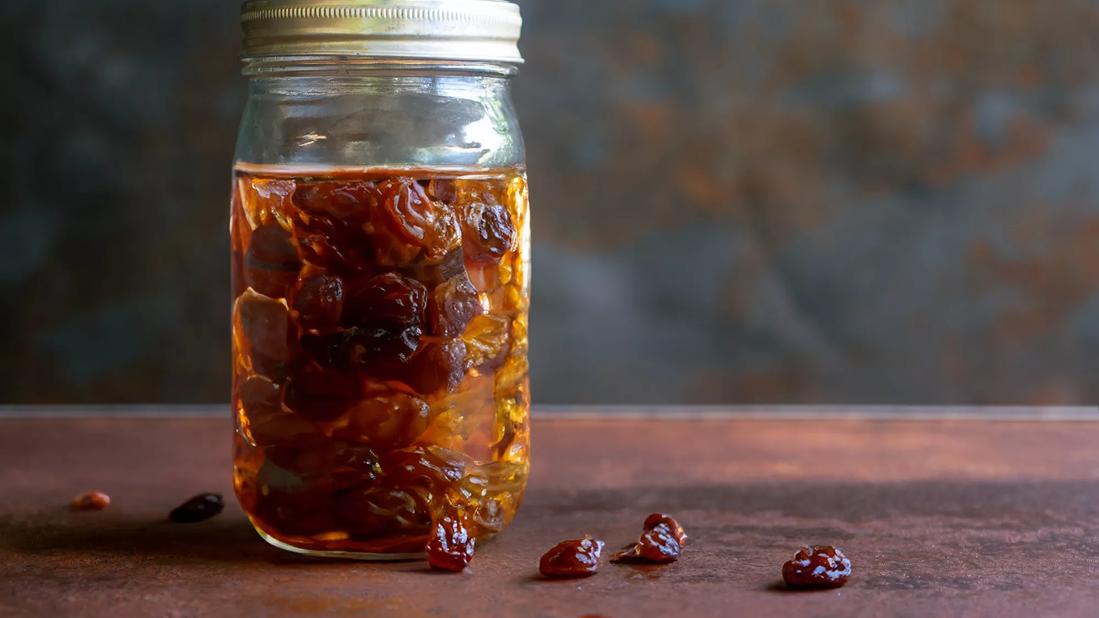Raisins have a number of health benefits when eaten — but raisin water probably won’t do much for you

Image content: This image is available to view online.
View image online (https://assets.clevelandclinic.org/transform/981c331b-ef25-4495-9180-d799e5cd90a3/raisin-water-1578414604)
Mason jar filled with water and raisins
If you’re looking to eke out a bit more nutritional value in your day, your search for ideas may have landed you on websites and publications extolling the benefits of drinking raisin water.
Advertisement
Cleveland Clinic is a non-profit academic medical center. Advertising on our site helps support our mission. We do not endorse non-Cleveland Clinic products or services. Policy
“Antioxidants!” the headlines scream. “More iron! Lose weight! Improve your skin! Benefit your gut health!”
And on and on.
But is that really the case? Can drinking a potion of water that’s been infused with raisins be the missing link to improving your overall health?
We talked with registered dietitian Gillian Culbertson, RD, LD, about what raisin water is and whether it truly offers the nutritional benefits you may have heard about.
Raisin water, also called kishmish water, is a drink made from soaking raisins overnight.
It’s easy enough to make:
The result is a drink that’s a light golden brown color and tastes slightly sweet.
And badda-boom! You’re on your way to a healthier you!
Except, maybe not exactly.
Proponents of raisin water will tell you that drinking water steeped with raisins will do all kinds of great things for your body.
The purported benefits of raisin water include things like:
But it’s important to note that the supposed perks of raisin water are based on the potential health benefits of the raisins themselves (and the grapes they come from). But whether any of those benefits transfer into brewed raisin water hasn’t been studied.
Advertisement
Even without scientific research to know for sure, Culbertson says that it’s not terribly likely that the health benefits of raisins will show up in raisin water.
“Raisins don’t dissolve well, meaning they don’t break down very much in water,” she shares. “So, the vast majority of their nutrients have a low solubility rate and probably aren’t going to wind up in the water.”
Raisin water enthusiasts will tell you that raisin water is high in vitamin C. Eating 50 raisins will garner you about 0.6 micrograms of vitamin C. That’s 1% of your recommended daily value (DV).
But when you make raisin water, you’re likely to lose most (if not all) of that vitamin C.
“Vitamin C is water soluble but is very likely to be destroyed when you make raisin water, since you have to boil it,” Culbertson explains.
Raisins also contain some fiber, about 3% DV in 50 raisins. But when you make raisin water, that fiber stays with the raisin, not with the water.
What is likely to seep out of the raisin is (at least some of) the sugar. (Remember, raisin water is touted for having a sweet taste.)
Going back to our 50-raisin serving size, you’re looking at about 17 grams of sugar. Without scientific research to understand the nutritional value of raisin water, it’s hard to say how much of that sugar is released in your raisin water. But chances are that if it’s sweet, it has at least some of those sugars in it.
Fiber is a natural counter to sugar that helps to keep sugar from being absorbed into your bloodstream. But remember, too, that your raisin water won’t have fiber. So, those sugars will get into your bloodstream quickly. And if you’re watching your sugar intake or have a condition like diabetes, you may want to be wary of raisin water.
There’s no reason to believe that raisin water is dangerous or could cause any risky side effects in most people. (Unless you’re allergic to raisins — then, it’s bad news). So, if you enjoy the taste of raisin water and you have a pantry full of raisins you’re itching to use up, it won't hurt to boil up some water, toss in some raisins and have a drink.
“Raisin water is essentially infused water, so it can help to change the taste of water if you’re looking for something different. If you want to drink it, there’s no harm in it,” Culbertson reassures. “But don’t expect that you’re getting a major nutritional boost from it.”
Advertisement

Sign up for our Health Essentials emails for expert guidance on nutrition, fitness, sleep, skin care and more.
Learn more about our editorial process.
Advertisement
Pick bell peppers to help fight cancer, memory decline and joint pain
The tropical fruit is a good source of antioxidants and vitamin C
High amounts of cholesterol and saturated fat in red meat may be linked to heart disease
The leaves and pods from this tree are rich in essential nutrients
This starchy root vegetable is a staple in many global cuisines — but it has to be prepared correctly, or it can cause serious concerns
These delicate green sprouts can give you an extra dose of vitamin K and other nutrients — but they’re not safe for everyone
Edamame, lentils and chicken breast are good sources of protein
Eating this root vegetable can help support your eye, heart and brain health
Prioritize your health by managing stress, strengthening your social connections and getting quality sleep
Bolsters, blankets, pillows and blocks can offer extra support, stability and comfort
Allergies, postnasal drip, asthma or reflux could be to blame for a cough that won’t quit